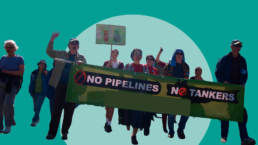The language of Enbridge, the pipeline company that moves dirty Tar Sands oil south from Canada, is an example of “Corporate Counterinsurgency.” There can be only one outcome: traumatizing and victimizing the indigenous led opposition to pipelines passing through Indian Country.
By Alleen Brown, The Intercept
As part of its efforts to build and operate pipelines, the oil transport company Enbridge used a tracking system that identified Indigenous-led groups as key threats. Internal documents reviewed by The Intercept describe how Enbridge launched an initiative known as Opposition Driven Operational Threats, or ODOT, to focus the company’s attention on Indigenous opposition to Line 3 and Line 5, two controversial pipelines that transport carbon-intensive tar sands oil between Canada and the United States.

The documents provide a rare window into how fossil fuel companies counteract political opposition. In Enbridge’s case, its ODOT initiative goes so far as to track community gatherings of pipeline opponents and label tribal lands as areas where the company faces threats. “To the rest of us, ‘threat’ means actual threats to life and liberty, but to them this is all about how much money they can extract while carrying out an operation that is environmentally devastating,” said Mara Verheyden-Hilliard, director of the Partnership for Civil Justice Fund’s Center for Protest Law and Litigation and an attorney representing opponents of Line 3. “You begin to have this perversion of concepts of what actually are true threats.”
Recent Posts
‘Unconstitutional. Unethical. Authoritarian.’ ICE Bars Millions Of Immigrants From Bond Hearings
July 18, 2025
Take Action Now One watchdog said the new policy “seems like a blatant attempt to stop them from exercising their right to due process.”……
Americans Are Not Nearly Alarmed Enough About Climate Change
July 18, 2025
Take Action Now Americans still don’t comprehend how imminent, dangerous, and far-reaching the threat is—and journalists are partly to blame.By…
The IRS Is Building A Vast System To Share Millions Of Taxpayers’ Data With ICE
July 17, 2025
Take Action Now ProPublica has obtained the blueprint for the Trump administration’s unprecedented plan to turn over IRS records to Homeland Security…
Israel’s Sudden Assault On Syria Is Unchecked Aggression
July 17, 2025
Take Action Now Jerusalem is bombing Damascus and threatening al-Sharaa’s rule, while Washington was hoping to help the nascent government on…




